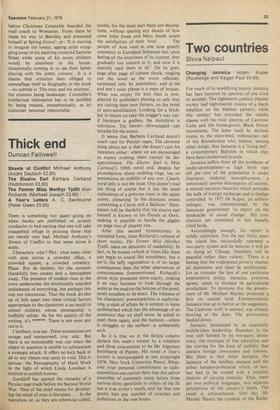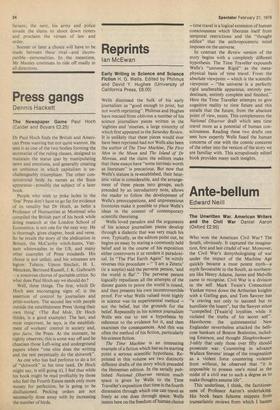Two countries
Shiva Naipaul
Changing Jamaica Adam Kuper (Routledge and Kegan Paul £4.95) For much of its unedifying history Jamaica has been haunted by spectres of one kind or another. The eighteenth century planter society had nightmarish visions of a black rebellion on the Haitian pattern; while this century has provided the middle classes with the twin spectres of Castroist Cuba and the home-grown Black Power movements. The latter leads by deviods routes to the slum-bred, millenarian cult of the Rastafarians who believe, among other things, that Jamaica is a 'living hell', a contemporary Babylon in which they have been condemned to exile.
Jamaica suffers from all the problems of under-development—a high birth rate (45 per cent of the population is under fourteen), endemic unemployment, a notoriously uneven distribution of income, a natural resource (bauxite) which provides the bulk of foreign exchange and is foreign controlled. In 1972 Dr Kuper, an anthropologist, was commissioned by the Jamaican government 'to report on the tendencies of social change'. His conclusions are contained in this banally titled book.
Astonishingly enough, his report is mildly optimistic. For the last thirty years the island has successfully operated a two-party system and he believes it will go on doing so. Change, therefore, will be peaceful rather than violent. 'There is a feeling that the widespread poverty shames all Jamaicans and must be ameliorated.' Let us consider the fate of one particular ameliorative policy. Jamaica, everyone agrees, needs to increase its agricultural production. To promote this the government of Mr Michael Manley proposed a levy on unused land. Entrepreneurial Jamaica rose up in horror at the suggestion. The Castroist wolf, it seemed, was already howling at the door. The government backed down.
Jamaica, dominated by an essentially middle-class leadership, flounders in the iron web formed by its two-party democracy, the mystique of free enterprise and the craving for the kind of stability that attracts foreign ,investment and tourists. But there is that other Jamaica, the Jamaica of the landless peasant and the urban lumpen-proletariat which, of late, has had to be wooed with a populist rhetoric of varying intensity. Thus, there are two political languages, two separate perceptions of the country's needs. The result is schizophrenia. One day Mr Manley flaunts the symbols of the Rasta farians; the next, his army and police invade the slums to shoot down rioters and proclaim the virtues of law and order.
Sooner or later a choice will have to be made between these rival—and incompatible—personalities. In the meantime, Mr Manley continues to ride off madly in all directions.



































 Previous page
Previous page